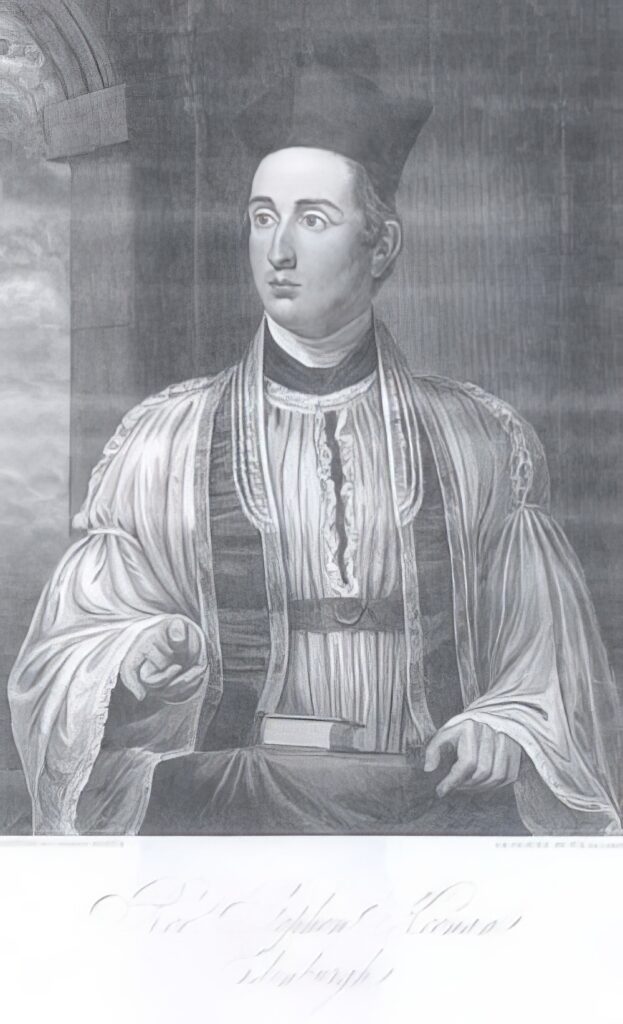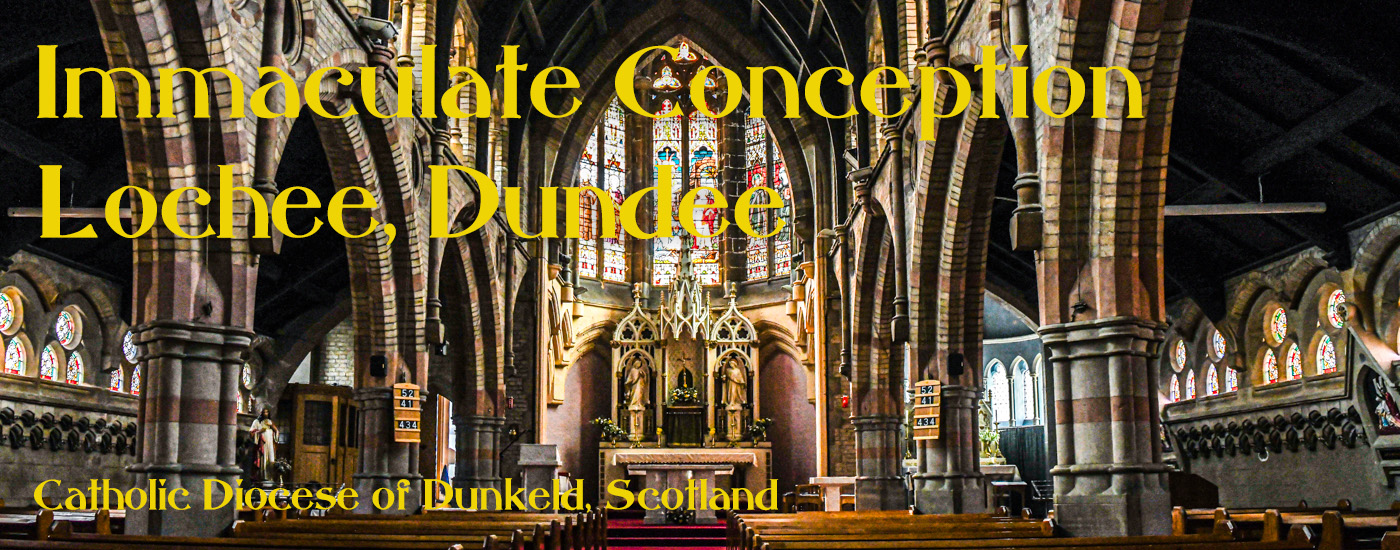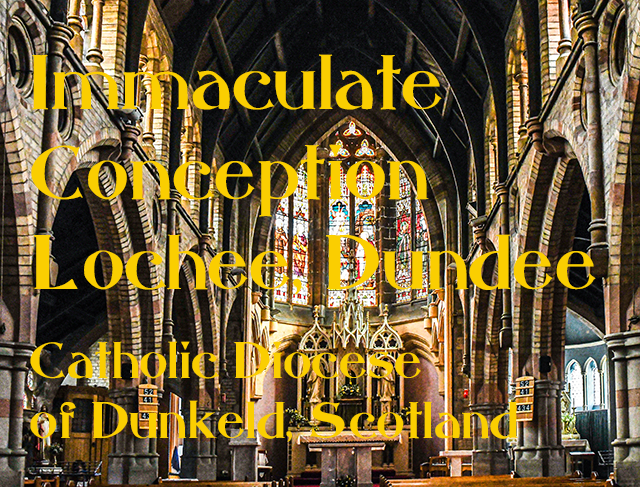In 1847, Fr Stephen Keenan bought a property, at Wellburn in order to build an academy to be known as St Clement’s. The coachhouse at Wellburn was converted into a chapel and the first Mass was said there on 8th September 1848.
18 years later a new church, St Mary’s, was built in the heart of Lochee.

There has just been erected in St Andrew’s Roman Catholic Chapel here, a handsome marble tablet, commemorative of the late Father Keenan, who, for so many years, occupied the position of principal clergyman of that church, and whose death last year was sincerely lamented by his attached flock. The tablet is inserted in the wall the right side the altar. It is composed of black marble, set in a chaste and tasteful border white freestone, from a design one of Mr Kennedy’s pupils at the High School, the sculpture being by Innes of this place. The following is the inscription on the tablet:-
MEMORIAE: PERENNI.
STEPHANI KEENAN. THEOLOG. DOCTORIS, HUJUS ECCLESIAE PER ANNON XX1(?) PASTORIS, FIDEI CATHOLICAE ORE OPERE CALAMO TUENDE AC PROPAGANDAE ZELO CONSPICUI ORDORMIVIT IN DOMINO PRID. KAL. MART. AN MDCCCLXII. ANNO AETATIS 58 SACRDOTII 33 SUB AEDE DEIPARE DE VICTORIIS IPSO CURANTE EXTRUCTA AMICUM ET PARENTEM CLERUS POPULUSQUE DEPOSERE CUM LACRIMIS
R.I.P.
TRIBUTUM GRATAE GREGIS.
As above stated, the monument was inaugurated on Wednesday, at half-past ten o’clock, when a Mass was said for the repose of the soul of the departed priest. The chapel was well filled. The officiated priest was the Rev. A. MacDonald, Wallacetown, Rev. Mr Dunn acted as Deacon, Rev. Mr Cumming as sub-deacon and the Rev. Mr Hannon, Edinburgh, as master of ceremonies.
The Rev. J.S. McCorry of Bathgate, preached from 2nd Timothy iv. 1-8. He began by referring to the solemn and affecting circumstances under which the great Apostle of the Gentiles wrote these last recorded words, which, after a lapse of 1800 years went home to one’s inmost heart. And might not this mournful and imposing occasion be permitted to repeat those self-same words in regard to one who, like the holy apostle had “fought the good fight, had finished his course, might not be allowed to employ these words in regard to one who had stood for many years where he then stood and whose words of burning eloquence made everyone to listen, frequently with profit, and always with delight: not allowed so to speak of him to the warm hearted Catholics of Dundee who were assembled that morning around the sanctuary to make remembrance of him who was their father and their friend, and to assist the inauguration that lasting memorial of their love and veneration the good and faithful pastor who had served them so long and so well? Yes, he said, with fight for religion, for the holy Church of God, for the poor, for the orphan and for the widow. From his first entrance into ministry, he girt up his loins for the holy contest, and did battle with the heroism of the most valiant, for the ancient faith of Christendom.
HIS EARLY LIFE
The speaker thereafter went to say that in the land of Erin their loved pastor was born in the year of grace 1804. When quite youthful came to this country, and resided with his parents in the Stewartry of Kirkcudbright. He afterwards went to Glasgow where he was engaged educational pursuits.
Feeling a strong impulse to enter into the ecclesiastical state, he was admitted into the seminary Aquhorties in 1828, where distinguished himself by his exemplary demeanour as well as by his talents and assiduous application, and on completing his theological curriculum, was ordained as a priest in 1830, returned to Scotland 1832, and was appointed junior priest in Edinburgh, and there distinguished himself by his devotion to his office in administering consolation to the victims of cholera, which raged to such a fearful extent during that year.
There being no Roman Catholic priests in Portobello, Dalkeith, Haddington, Galashiels, Kelso, Jedburgh, Ratho, Bathgate, Linlithgow, Falkirk, or Stirling, had also to make frequent pilgrimages to these places; and he was afterwards sent to assist the aged priest of Dumfries, who was almost worn out the calls upon him. After speaking of the wisdom of the law of the Romish Church enjoining its priesthood, and assigning this as reason for the devotion of the people their priests, he went to speak of:
DR KEENAN’S PULPIT MINISTRATIONS
Nature had, he said, been decidedly favourable to him as an orator. Elevated in his stature, with a fine head and countenance, with a most penetrating eye, his appearance, they remembered well, was remarkably imposing, and his voice, that voice whose echoes still lingered their ears—was rich and most melodious. His enunciation was most emphatic and distinct—his manner singularly impressive—and his matter perspicuous and convincing. He was likewise in earnest, and that was the great secret of oratory. Then, delivered as they were with that natural and graceful elocution peculiarly his own, and with that glowing eloquence with which he invested every syllable uttered, his discourses never failed to produce most beneficial results.
The sermons which he spoke led captive the hearts of his hearers, and the lectures which he delivered upon controverted points never appealed in vain to the understanding. While deeply argumentative, they were wonderfully clear. They were the means of strengthening the faith of the children of the church, and, moreover gathering into her folds many who had unfortunately been strangers to her communion. By the poor, Father Keenan was literally adored, by the rich was held in the highest estimation.
HIS TRANSLATION TO DUNDEE.
After labouring for several years in Edinburgh, where, by his zeal, his devotedness and his eloquence he won golden opinions, he was sent to the town of Dundee, because a rapidly increasing Catholic population required the services of an additional clergyman. His reputation as a most hard working, earnest priest had gone before him, and they themselves could testify that his worth was even greater than his fame. No wonder, then, that his arrival was a powerful stimulus to the interests of religion, and that he quickly became what had been in Edinburgh, the idol of the people —not that ephemeral popularity which was altogether unworthy of the priest and of the Christian – that he constantly despised; but he was devoted to his duty; to his God, and to the Church, and despised the smiles and frowns of all around. No one spoke out more fearlessly. It might be that sometimes he spoke with too great impetuosity, but the singleness of purpose by which he was animated had devoured every fibre in his heart, and forbade him to give utterance to his feelings in frigid tones, or tame, hesitating, or modified phraseology. And moreover his piety was ever most sincere, but never ostentatious. He ever sought to reclaim from vice, and his denunciation all secret societies, especially Ribbon Societies, would be long remembered. He promoted zealously the interests of education; be espoused the cause of the poor, the widow, and particularly the orphan child, for whose benefit he left all that possessed. He left nothing undone which could advance the glory of God, the interest of religion, and the good of God people. Look at that monument God’s glory, which was the means of raising, is that noble structure, St Mary’s Church. Look at the ample school and residence for the teacher; look the property Wellburn, and the residence of those ladies who have forsaken the world for the cause of God religion. further referred to the hospitality displayed by him to all his fellows of the priesthood who visited this town, whether duty or relaxation. He thereafter spoke of him as an author, characterising him as man of great grasp of intellect, of liberal and enlightened views, and most varied acquirements, and expressed his regret that his labours in the Church left him so little leisure to devote to the labours of composition. After referring to his Controversial Catechism, which gained for him the highest approbation of the Bishop of the Eastern Vicariate, and won for him, from the ecclesiastical authorities at Rome, the degree of Doctor of Divinity, he concluded by a reference his last public appearance, to rebuke some who had wandered from the fold to join Secret Societies, to his death, and the sorrow manifested for him by his people, which was so marked and genuine, that several Protestants had been converted with the sight thereof.
The discourse was listened to with close attention, and times with considerable apparent emotion.
THE DUNDEE COURIER AND ARGUS – Thursday 21st May 1863
Iay 1863


